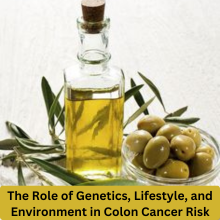
Colon cancer is an increasingly alarming concern, particularly for younger generations. A new study published in Gut has brought attention to the role of ultraprocessed foods, particularly those containing high amounts of omega-6 fatty acids from seed oils, in increasing the risk of colon cancer. This study sheds light on how these ingredients, often found in fast foods and packaged snacks, might be contributing to inflammation, a critical factor in the development of colon cancer.
The Rising Epidemic of Colon Cancer in Younger Generations
Colon cancer, once primarily a concern for older adults, is now affecting younger individuals in alarming numbers. Over the past few decades, there has been a noticeable increase in colon and rectal cancer cases among people under the age of 50. This trend has baffled medical experts and raised serious concerns. While genetics, lifestyle, and environmental factors play a part, researchers are pointing to a key culprit: the modern diet.
A major shift towards consuming ultraprocessed foods, rich in unhealthy fats, sugars, and artificial ingredients, has coincided with the rise in younger people being diagnosed with colon cancer. Experts believe this dietary change is one of the reasons behind the increase in these cancer rates, especially in rural and lower-income populations who are more likely to consume fast food and packaged snacks due to their low cost and convenience.
What Are Omega-6 Fatty Acids?
Omega-6 fatty acids are a type of polyunsaturated fat that our body needs for various functions, including cell growth and maintaining healthy skin. However, like many things, moderation is key. The issue arises when we consume these fatty acids in excessive amounts, especially when they are heavily processed and refined.
Omega-6 fatty acids are predominantly found in seed oils such as canola, sunflower, corn, and soybean oils. These oils are commonly used in the preparation of ultraprocessed foods, which have become staples in many diets, particularly in the United States. While omega-6s are essential in small amounts, our modern diet is flooded with them, contributing to a host of health problems, including inflammation.
The Role of Inflammation in Cancer Development
Inflammation is a normal, protective response by the immune system to fight off infections or heal injuries. However, when inflammation becomes chronic, it can cause damage to healthy cells and increase the risk of cancer. Colon cancer cells, under a microscope, resemble “poorly healed wounds,” showing that chronic inflammation can promote the uncontrolled growth of abnormal cells.
The recent study published in Gut highlights how excessive omega-6 fatty acids can promote chronic inflammation, which fuels the development of cancerous cells in the colon. When inflammation remains unchecked, it creates an environment that allows cancer cells to proliferate and spread.
Seed Oils and Their Role in Ultraprocessed Foods
Seed oils are cheap, easy to produce, and widely used in the food industry. They are often found in fast food, packaged snacks, baked goods, salad dressings, and many processed foods. These oils are typically refined and chemically processed, which further increases the omega-6 fatty acid content.
The study found that omega-6 fatty acids, commonly derived from seed oils, were abundant in colon cancer tumor samples. This suggests that the overconsumption of seed oils through ultraprocessed foods could play a significant role in increasing the risk of colon cancer, particularly among young people.
The Link Between Seed Oils and Inflammation in the Body
When we consume too many omega-6 fatty acids and not enough omega-3 fatty acids, the body enters a state of chronic inflammation. This inflammation is the body’s attempt to repair damaged tissues, but over time, it can lead to the development of cancer. Omega-6 fatty acids are pro-inflammatory, while omega-3 fatty acids have anti-inflammatory properties. However, modern diets are often severely imbalanced, with omega-6s being much more prevalent than omega-3s.
The excessive intake of omega-6-rich seed oils promotes inflammation, making the colon more susceptible to cancer development. The study suggests that this imbalance in fatty acids is one of the key factors behind the rise in colon cancer cases, particularly among younger individuals.
A Breakdown of Key Findings from the Study
The study analyzed colon cancer tumor samples from 81 people in the United States and discovered an alarming imbalance in the types of fatty acids present. Tumors showed excessive amounts of omega-6 fatty acids, which are known to promote inflammation, and a lack of omega-3 fatty acids, which are anti-inflammatory and may help prevent cancer.
These findings point to a direct link between the consumption of ultraprocessed foods, which are rich in omega-6 fatty acids from seed oils, and an increased risk of colon cancer. While the study does not pinpoint specific foods or oils as the sole cause, it strongly suggests that the types of fats we consume play a significant role in cancer development.
Also read: RSV, Flu & Stomach Viruses: What’s Spreading in Detroit?
The Impact of a Western Diet on Colon Cancer Rates
The shift toward a Western diet, characterized by high consumption of ultraprocessed foods, sugary drinks, and unhealthy fats, has significantly impacted health outcomes, including an increase in colon cancer rates. This dietary pattern has led to an imbalance in omega-6 and omega-3 fatty acids, further fueling inflammation and increasing the risk of cancer.
A diet rich in seed oils, processed meats, and refined carbohydrates can create an environment in the body that promotes cancer cell growth. This imbalance between omega-6 and omega-3 fatty acids is one of the key factors contributing to the rising rates of colon cancer in younger people.
Understanding the Omega-6 to Omega-3 Ratio
The ideal omega-6 to omega-3 ratio in the body is about 4:1. However, modern diets, especially those in Western countries, often have a ratio as high as 30:1, due to the overconsumption of omega-6-rich oils and the underconsumption of omega-3-rich foods.
This imbalance contributes to chronic inflammation, which is a major risk factor for colon cancer. By reducing the intake of omega-6 fatty acids and increasing the consumption of omega-3s, individuals can help restore a healthier balance and reduce the risk of cancer.
The Role of Genetics, Lifestyle, and Environment in Colon Cancer Risk
While diet plays a crucial role in colon cancer risk, it is important to remember that other factors, such as genetics, exercise, and environmental exposures, also contribute to the development of cancer. Genetics can influence how the body processes certain foods, while lifestyle factors like physical activity, smoking, and alcohol consumption can further increase or decrease risk.
Environmental factors, including exposure to chemicals or pollutants, can also affect cancer development. Researchers are working to understand how these factors interact with diet to contribute to the rising incidence of colon cancer in younger people.
The Challenge of Reducing Seed Oil Consumption
Seed oils are cheap and widely available, making them a common ingredient in many processed and fast foods. They are often hidden in foods that seem otherwise healthy, like packaged bread or salad dressings. This makes it challenging for individuals to avoid seed oils without making significant changes to their diet.
While it may not be practical to eliminate seed oils entirely, reducing their consumption can have a positive impact on health. Choosing whole, unprocessed foods, cooking at home with healthier oils like olive oil or avocado oil, and being mindful of food labels are effective ways to reduce seed oil intake.
Can Omega-3 Fatty Acids Help Prevent Colon Cancer?
Omega-3 fatty acids, found in foods like fatty fish, flaxseed, and walnuts, have anti-inflammatory properties that may help reduce the risk of colon cancer. Studies have shown that omega-3s can help balance the body’s inflammatory response and promote healthy cell function.
Incorporating more omega-3-rich foods into the diet may be an effective strategy for reducing colon cancer risk. However, more research is needed to fully understand the potential benefits of omega-3 supplementation in cancer prevention.
Potential Solutions: How to Reduce the Impact of Seed Oils on Colon Cancer Risk
There are several ways to reduce the impact of seed oils and improve the balance of omega-6 and omega-3 fatty acids in the diet:
- Choose healthier oils: Opt for olive oil, avocado oil, or coconut oil, which contain healthier fats and are less processed than seed oils.
- Cook at home: Preparing meals from scratch allows you to control the types of oils used in cooking.
- Eat a balanced diet: Incorporate more whole foods, fruits, vegetables, and lean proteins into your diet to reduce your reliance on ultraprocessed foods.
By making these changes, individuals can help reduce their risk of colon cancer and improve their overall health.
The Importance of Public Awareness and Education
One of the key challenges in combating the rising rates of colon cancer is a lack of public awareness about the dangers of omega-6-rich oils and ultraprocessed foods. Education campaigns that highlight the health risks of these foods, as well as the benefits of a balanced, whole-foods-based diet, are essential.
Health organizations, governments, and food manufacturers must work together to raise awareness and promote healthier dietary choices, especially among younger populations who are most at risk.
Also read: Get Up to $1,500 Fast: Jackson Hewitt Holiday Loan Explained
Conclusion
The new study sheds light on the potential role of omega-6 fatty acids from seed oils in fueling colon cancer development. While more research is needed to establish a direct causal link, the evidence suggests that the modern diet, rich in ultraprocessed foods and seed oils, is a significant contributor to the rise in colon cancer cases, particularly among younger people.
By making conscious dietary choices and reducing the intake of seed oils, we can help lower the risk of colon cancer and other health issues related to chronic inflammation. Public awareness and education will be crucial in reversing this trend and promoting healthier eating habits for future generations.
FAQs
What are omega-6 fatty acids, and are they bad for you?
Omega-6 fatty acids are essential fats that our body needs. However, when consumed in excess, they can contribute to inflammation, which is a risk factor for colon cancer.
How can I reduce my intake of omega-6-rich oils?
You can reduce omega-6 consumption by avoiding processed foods and choosing healthier cooking oils like olive oil, avocado oil, or coconut oil.
What foods are high in omega-3s?
Omega-3s are found in fatty fish (like salmon and sardines), flaxseeds, walnuts, and chia seeds. These can help balance the inflammatory response in the body.
Can a diet change alone reduce the risk of colon cancer?
While diet plays a significant role, other factors like genetics, exercise, and environment also contribute to cancer risk. A healthy lifestyle, including diet, can help reduce the overall risk.
What role do genetics play in colon cancer risk?
Genetics can influence how the body processes certain foods and how susceptible individuals are to cancer. However, lifestyle and environmental factors are also crucial in determining risk.

